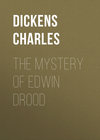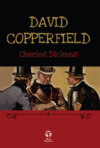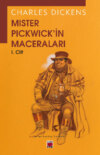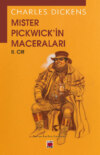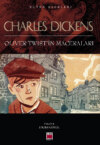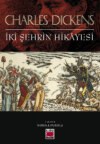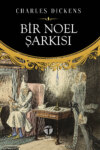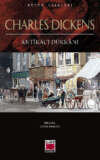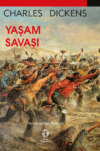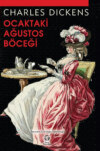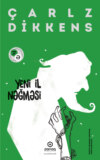Kitabı oku: «The Mystery of Edwin Drood», sayfa 16
‘Now, you know,’ said Mr. Grewgious, ‘I couldn’t write a play.’
‘Not a bad one, sir?’ said Rosa, innocently, with her eyebrows again in action.
‘No. If I was under sentence of decapitation, and was about to be instantly decapitated, and an express arrived with a pardon for the condemned convict Grewgious if he wrote a play, I should be under the necessity of resuming the block, and begging the executioner to proceed to extremities, – meaning,’ said Mr. Grewgious, passing his hand under his chin, ‘the singular number, and this extremity.’
Rosa appeared to consider what she would do if the awkward supposititious case were hers.
‘Consequently,’ said Mr. Grewgious, ‘Mr. Bazzard would have a sense of my inferiority to himself under any circumstances; but when I am his master, you know, the case is greatly aggravated.’
Mr. Grewgious shook his head seriously, as if he felt the offence to be a little too much, though of his own committing.
‘How came you to be his master, sir?’ asked Rosa.
‘A question that naturally follows,’ said Mr. Grewgious. ‘Let’s talk. Mr. Bazzard’s father, being a Norfolk farmer, would have furiously laid about him with a flail, a pitch-fork, and every agricultural implement available for assaulting purposes, on the slightest hint of his son’s having written a play. So the son, bringing to me the father’s rent (which I receive), imparted his secret, and pointed out that he was determined to pursue his genius, and that it would put him in peril of starvation, and that he was not formed for it.’
‘For pursuing his genius, sir?’
‘No, my dear,’ said Mr. Grewgious, ‘for starvation. It was impossible to deny the position, that Mr. Bazzard was not formed to be starved, and Mr. Bazzard then pointed out that it was desirable that I should stand between him and a fate so perfectly unsuited to his formation. In that way Mr. Bazzard became my clerk, and he feels it very much.’
‘I am glad he is grateful,’ said Rosa.
‘I didn’t quite mean that, my dear. I mean, that he feels the degradation. There are some other geniuses that Mr. Bazzard has become acquainted with, who have also written tragedies, which likewise nobody will on any account whatever hear of bringing out, and these choice spirits dedicate their plays to one another in a highly panegyrical manner. Mr. Bazzard has been the subject of one of these dedications. Now, you know, I never had a play dedicated to me!’
Rosa looked at him as if she would have liked him to be the recipient of a thousand dedications.
‘Which again, naturally, rubs against the grain of Mr. Bazzard,’ said Mr. Grewgious. ‘He is very short with me sometimes, and then I feel that he is meditating, “This blockhead is my master! A fellow who couldn’t write a tragedy on pain of death, and who will never have one dedicated to him with the most complimentary congratulations on the high position he has taken in the eyes of posterity!” Very trying, very trying. However, in giving him directions, I reflect beforehand: “Perhaps he may not like this,” or “He might take it ill if I asked that;” and so we get on very well. Indeed, better than I could have expected.’
‘Is the tragedy named, sir?’ asked Rosa.
‘Strictly between ourselves,’ answered Mr. Grewgious, ‘it has a dreadfully appropriate name. It is called The Thorn of Anxiety. But Mr. Bazzard hopes – and I hope – that it will come out at last.’
It was not hard to divine that Mr. Grewgious had related the Bazzard history thus fully, at least quite as much for the recreation of his ward’s mind from the subject that had driven her there, as for the gratification of his own tendency to be social and communicative.
‘And now, my dear,’ he said at this point, ‘if you are not too tired to tell me more of what passed to-day – but only if you feel quite able – I should be glad to hear it. I may digest it the better, if I sleep on it to-night.’
Rosa, composed now, gave him a faithful account of the interview. Mr. Grewgious often smoothed his head while it was in progress, and begged to be told a second time those parts which bore on Helena and Neville. When Rosa had finished, he sat grave, silent, and meditative for a while.
‘Clearly narrated,’ was his only remark at last, ‘and, I hope, clearly put away here,’ smoothing his head again. ‘See, my dear,’ taking her to the open window, ‘where they live! The dark windows over yonder.’
‘I may go to Helena to-morrow?’ asked Rosa.
‘I should like to sleep on that question to-night,’ he answered doubtfully. ‘But let me take you to your own rest, for you must need it.’
With that Mr. Grewgious helped her to get her hat on again, and hung upon his arm the very little bag that was of no earthly use, and led her by the hand (with a certain stately awkwardness, as if he were going to walk a minuet) across Holborn, and into Furnival’s Inn. At the hotel door, he confided her to the Unlimited head chambermaid, and said that while she went up to see her room, he would remain below, in case she should wish it exchanged for another, or should find that there was anything she wanted.
Rosa’s room was airy, clean, comfortable, almost gay. The Unlimited had laid in everything omitted from the very little bag (that is to say, everything she could possibly need), and Rosa tripped down the great many stairs again, to thank her guardian for his thoughtful and affectionate care of her.
‘Not at all, my dear,’ said Mr. Grewgious, infinitely gratified; ‘it is I who thank you for your charming confidence and for your charming company. Your breakfast will be provided for you in a neat, compact, and graceful little sitting-room (appropriate to your figure), and I will come to you at ten o’clock in the morning. I hope you don’t feel very strange indeed, in this strange place.’
‘O no, I feel so safe!’
‘Yes, you may be sure that the stairs are fire-proof,’ said Mr. Grewgious, ‘and that any outbreak of the devouring element would be perceived and suppressed by the watchmen.’
‘I did not mean that,’ Rosa replied. ‘I mean, I feel so safe from him.’
‘There is a stout gate of iron bars to keep him out,’ said Mr. Grewgious, smiling; ‘and Furnival’s is fire-proof, and specially watched and lighted, and I live over the way!’ In the stoutness of his knight-errantry, he seemed to think the last-named protection all sufficient. In the same spirit he said to the gate-porter as he went out, ‘If some one staying in the hotel should wish to send across the road to me in the night, a crown will be ready for the messenger.’ In the same spirit, he walked up and down outside the iron gate for the best part of an hour, with some solicitude; occasionally looking in between the bars, as if he had laid a dove in a high roost in a cage of lions, and had it on his mind that she might tumble out.
CHAPTER XXI – A RECOGNITION
Nothing occurred in the night to flutter the tired dove; and the dove arose refreshed. With Mr. Grewgious, when the clock struck ten in the morning, came Mr. Crisparkle, who had come at one plunge out of the river at Cloisterham.
‘Miss Twinkleton was so uneasy, Miss Rosa,’ he explained to her, ‘and came round to Ma and me with your note, in such a state of wonder, that, to quiet her, I volunteered on this service by the very first train to be caught in the morning. I wished at the time that you had come to me; but now I think it best that you did as you did, and came to your guardian.’
‘I did think of you,’ Rosa told him; ‘but Minor Canon Corner was so near him – ’
‘I understand. It was quite natural.’
‘I have told Mr. Crisparkle,’ said Mr. Grewgious, ‘all that you told me last night, my dear. Of course I should have written it to him immediately; but his coming was most opportune. And it was particularly kind of him to come, for he had but just gone.’
‘Have you settled,’ asked Rosa, appealing to them both, ‘what is to be done for Helena and her brother?’
‘Why really,’ said Mr. Crisparkle, ‘I am in great perplexity. If even Mr. Grewgious, whose head is much longer than mine, and who is a whole night’s cogitation in advance of me, is undecided, what must I be!’
The Unlimited here put her head in at the door – after having rapped, and been authorised to present herself – announcing that a gentleman wished for a word with another gentleman named Crisparkle, if any such gentleman were there. If no such gentleman were there, he begged pardon for being mistaken.
‘Such a gentleman is here,’ said Mr. Crisparkle, ‘but is engaged just now.’
‘Is it a dark gentleman?’ interposed Rosa, retreating on her guardian.
‘No, Miss, more of a brown gentleman.’
‘You are sure not with black hair?’ asked Rosa, taking courage.
‘Quite sure of that, Miss. Brown hair and blue eyes.’
‘Perhaps,’ hinted Mr. Grewgious, with habitual caution, ‘it might be well to see him, reverend sir, if you don’t object. When one is in a difficulty or at a loss, one never knows in what direction a way out may chance to open. It is a business principle of mine, in such a case, not to close up any direction, but to keep an eye on every direction that may present itself. I could relate an anecdote in point, but that it would be premature.’
‘If Miss Rosa will allow me, then? Let the gentleman come in,’ said Mr. Crisparkle.
The gentleman came in; apologised, with a frank but modest grace, for not finding Mr. Crisparkle alone; turned to Mr. Crisparkle, and smilingly asked the unexpected question: ‘Who am I?’
‘You are the gentleman I saw smoking under the trees in Staple Inn, a few minutes ago.’
‘True. There I saw you. Who else am I?’
Mr. Crisparkle concentrated his attention on a handsome face, much sunburnt; and the ghost of some departed boy seemed to rise, gradually and dimly, in the room.
The gentleman saw a struggling recollection lighten up the Minor Canon’s features, and smiling again, said: ‘What will you have for breakfast this morning? You are out of jam.’
‘Wait a moment!’ cried Mr. Crisparkle, raising his right hand. ‘Give me another instant! Tartar!’
The two shook hands with the greatest heartiness, and then went the wonderful length – for Englishmen – of laying their hands each on the other’s shoulders, and looking joyfully each into the other’s face.
‘My old fag!’ said Mr. Crisparkle.
‘My old master!’ said Mr. Tartar.
‘You saved me from drowning!’ said Mr. Crisparkle.
‘After which you took to swimming, you know!’ said Mr. Tartar.
‘God bless my soul!’ said Mr. Crisparkle.
‘Amen!’ said Mr. Tartar.
And then they fell to shaking hands most heartily again.
‘Imagine,’ exclaimed Mr. Crisparkle, with glistening eyes: ‘Miss Rosa Bud and Mr. Grewgious, imagine Mr. Tartar, when he was the smallest of juniors, diving for me, catching me, a big heavy senior, by the hair of the head, and striking out for the shore with me like a water-giant!’
‘Imagine my not letting him sink, as I was his fag!’ said Mr. Tartar. ‘But the truth being that he was my best protector and friend, and did me more good than all the masters put together, an irrational impulse seized me to pick him up, or go down with him.’
‘Hem! Permit me, sir, to have the honour,’ said Mr. Grewgious, advancing with extended hand, ‘for an honour I truly esteem it. I am proud to make your acquaintance. I hope you didn’t take cold. I hope you were not inconvenienced by swallowing too much water. How have you been since?’
It was by no means apparent that Mr. Grewgious knew what he said, though it was very apparent that he meant to say something highly friendly and appreciative.
If Heaven, Rosa thought, had but sent such courage and skill to her poor mother’s aid! And he to have been so slight and young then!
‘I don’t wish to be complimented upon it, I thank you; but I think I have an idea,’ Mr. Grewgious announced, after taking a jog-trot or two across the room, so unexpected and unaccountable that they all stared at him, doubtful whether he was choking or had the cramp – ‘I think I have an idea. I believe I have had the pleasure of seeing Mr. Tartar’s name as tenant of the top set in the house next the top set in the corner?’
‘Yes, sir,’ returned Mr. Tartar. ‘You are right so far.’
‘I am right so far,’ said Mr. Grewgious. ‘Tick that off;’ which he did, with his right thumb on his left. ‘Might you happen to know the name of your neighbour in the top set on the other side of the party-wall?’ coming very close to Mr. Tartar, to lose nothing of his face, in his shortness of sight.
‘Landless.’
‘Tick that off,’ said Mr. Grewgious, taking another trot, and then coming back. ‘No personal knowledge, I suppose, sir?’
‘Slight, but some.’
‘Tick that off,’ said Mr. Grewgious, taking another trot, and again coming back. ‘Nature of knowledge, Mr. Tartar?’
‘I thought he seemed to be a young fellow in a poor way, and I asked his leave – only within a day or so – to share my flowers up there with him; that is to say, to extend my flower-garden to his windows.’
‘Would you have the kindness to take seats?’ said Mr. Grewgious. ‘I have an idea!’
They complied; Mr. Tartar none the less readily, for being all abroad; and Mr. Grewgious, seated in the centre, with his hands upon his knees, thus stated his idea, with his usual manner of having got the statement by heart.
‘I cannot as yet make up my mind whether it is prudent to hold open communication under present circumstances, and on the part of the fair member of the present company, with Mr. Neville or Miss Helena. I have reason to know that a local friend of ours (on whom I beg to bestow a passing but a hearty malediction, with the kind permission of my reverend friend) sneaks to and fro, and dodges up and down. When not doing so himself, he may have some informant skulking about, in the person of a watchman, porter, or such-like hanger-on of Staple. On the other hand, Miss Rosa very naturally wishes to see her friend Miss Helena, and it would seem important that at least Miss Helena (if not her brother too, through her) should privately know from Miss Rosa’s lips what has occurred, and what has been threatened. Am I agreed with generally in the views I take?’
‘I entirely coincide with them,’ said Mr. Crisparkle, who had been very attentive.
‘As I have no doubt I should,’ added Mr. Tartar, smiling, ‘if I understood them.’
‘Fair and softly, sir,’ said Mr. Grewgious; ‘we shall fully confide in you directly, if you will favour us with your permission. Now, if our local friend should have any informant on the spot, it is tolerably clear that such informant can only be set to watch the chambers in the occupation of Mr. Neville. He reporting, to our local friend, who comes and goes there, our local friend would supply for himself, from his own previous knowledge, the identity of the parties. Nobody can be set to watch all Staple, or to concern himself with comers and goers to other sets of chambers: unless, indeed, mine.’
‘I begin to understand to what you tend,’ said Mr. Crisparkle, ‘and highly approve of your caution.’
‘I needn’t repeat that I know nothing yet of the why and wherefore,’ said Mr. Tartar; ‘but I also understand to what you tend, so let me say at once that my chambers are freely at your disposal.’
‘There!’ cried Mr. Grewgious, smoothing his head triumphantly, ‘now we have all got the idea. You have it, my dear?’
‘I think I have,’ said Rosa, blushing a little as Mr. Tartar looked quickly towards her.
‘You see, you go over to Staple with Mr. Crisparkle and Mr. Tartar,’ said Mr. Grewgious; ‘I going in and out, and out and in alone, in my usual way; you go up with those gentlemen to Mr. Tartar’s rooms; you look into Mr. Tartar’s flower-garden; you wait for Miss Helena’s appearance there, or you signify to Miss Helena that you are close by; and you communicate with her freely, and no spy can be the wiser.’
‘I am very much afraid I shall be – ’
‘Be what, my dear?’ asked Mr. Grewgious, as she hesitated. ‘Not frightened?’
‘No, not that,’ said Rosa, shyly; ‘in Mr. Tartar’s way. We seem to be appropriating Mr. Tartar’s residence so very coolly.’
‘I protest to you,’ returned that gentleman, ‘that I shall think the better of it for evermore, if your voice sounds in it only once.’
Rosa, not quite knowing what to say about that, cast down her eyes, and turning to Mr. Grewgious, dutifully asked if she should put her hat on? Mr. Grewgious being of opinion that she could not do better, she withdrew for the purpose. Mr. Crisparkle took the opportunity of giving Mr. Tartar a summary of the distresses of Neville and his sister; the opportunity was quite long enough, as the hat happened to require a little extra fitting on.
Mr. Tartar gave his arm to Rosa, and Mr. Crisparkle walked, detached, in front.
‘Poor, poor Eddy!’ thought Rosa, as they went along.
Mr. Tartar waved his right hand as he bent his head down over Rosa, talking in an animated way.
‘It was not so powerful or so sun-browned when it saved Mr. Crisparkle,’ thought Rosa, glancing at it; ‘but it must have been very steady and determined even then.’
Mr. Tartar told her he had been a sailor, roving everywhere for years and years.
‘When are you going to sea again?’ asked Rosa.
‘Never!’
Rosa wondered what the girls would say if they could see her crossing the wide street on the sailor’s arm. And she fancied that the passers-by must think her very little and very helpless, contrasted with the strong figure that could have caught her up and carried her out of any danger, miles and miles without resting.
She was thinking further, that his far-seeing blue eyes looked as if they had been used to watch danger afar off, and to watch it without flinching, drawing nearer and nearer: when, happening to raise her own eyes, she found that he seemed to be thinking something about them.
This a little confused Rosebud, and may account for her never afterwards quite knowing how she ascended (with his help) to his garden in the air, and seemed to get into a marvellous country that came into sudden bloom like the country on the summit of the magic bean-stalk. May it flourish for ever!
CHAPTER XXII – A GRITTY STATE OF THINGS COMES ON
Mr. Tartar’s chambers were the neatest, the cleanest, and the best-ordered chambers ever seen under the sun, moon, and stars. The floors were scrubbed to that extent, that you might have supposed the London blacks emancipated for ever, and gone out of the land for good. Every inch of brass-work in Mr. Tartar’s possession was polished and burnished, till it shone like a brazen mirror. No speck, nor spot, nor spatter soiled the purity of any of Mr. Tartar’s household gods, large, small, or middle-sized. His sitting-room was like the admiral’s cabin, his bath-room was like a dairy, his sleeping-chamber, fitted all about with lockers and drawers, was like a seedsman’s shop; and his nicely-balanced cot just stirred in the midst, as if it breathed. Everything belonging to Mr. Tartar had quarters of its own assigned to it: his maps and charts had their quarters; his books had theirs; his brushes had theirs; his boots had theirs; his clothes had theirs; his case-bottles had theirs; his telescopes and other instruments had theirs. Everything was readily accessible. Shelf, bracket, locker, hook, and drawer were equally within reach, and were equally contrived with a view to avoiding waste of room, and providing some snug inches of stowage for something that would have exactly fitted nowhere else. His gleaming little service of plate was so arranged upon his sideboard as that a slack salt-spoon would have instantly betrayed itself; his toilet implements were so arranged upon his dressing-table as that a toothpick of slovenly deportment could have been reported at a glance. So with the curiosities he had brought home from various voyages. Stuffed, dried, repolished, or otherwise preserved, according to their kind; birds, fishes, reptiles, arms, articles of dress, shells, seaweeds, grasses, or memorials of coral reef; each was displayed in its especial place, and each could have been displayed in no better place. Paint and varnish seemed to be kept somewhere out of sight, in constant readiness to obliterate stray finger-marks wherever any might become perceptible in Mr. Tartar’s chambers. No man-of-war was ever kept more spick and span from careless touch. On this bright summer day, a neat awning was rigged over Mr. Tartar’s flower-garden as only a sailor can rig it, and there was a sea-going air upon the whole effect, so delightfully complete, that the flower-garden might have appertained to stern-windows afloat, and the whole concern might have bowled away gallantly with all on board, if Mr. Tartar had only clapped to his lips the speaking-trumpet that was slung in a corner, and given hoarse orders to heave the anchor up, look alive there, men, and get all sail upon her!
Mr. Tartar doing the honours of this gallant craft was of a piece with the rest. When a man rides an amiable hobby that shies at nothing and kicks nobody, it is only agreeable to find him riding it with a humorous sense of the droll side of the creature. When the man is a cordial and an earnest man by nature, and withal is perfectly fresh and genuine, it may be doubted whether he is ever seen to greater advantage than at such a time. So Rosa would have naturally thought (even if she hadn’t been conducted over the ship with all the homage due to the First Lady of the Admiralty, or First Fairy of the Sea), that it was charming to see and hear Mr. Tartar half laughing at, and half rejoicing in, his various contrivances. So Rosa would have naturally thought, anyhow, that the sunburnt sailor showed to great advantage when, the inspection finished, he delicately withdrew out of his admiral’s cabin, beseeching her to consider herself its Queen, and waving her free of his flower-garden with the hand that had had Mr. Crisparkle’s life in it.
‘Helena! Helena Landless! Are you there?’
‘Who speaks to me? Not Rosa?’ Then a second handsome face appearing.
‘Yes, my darling!’
‘Why, how did you come here, dearest?’
‘I – I don’t quite know,’ said Rosa with a blush; ‘unless I am dreaming!’
Why with a blush? For their two faces were alone with the other flowers. Are blushes among the fruits of the country of the magic bean-stalk?
‘I am not dreaming,’ said Helena, smiling. ‘I should take more for granted if I were. How do we come together – or so near together – so very unexpectedly?’
Unexpectedly indeed, among the dingy gables and chimney-pots of P. J. T.’s connection, and the flowers that had sprung from the salt sea. But Rosa, waking, told in a hurry how they came to be together, and all the why and wherefore of that matter.
‘And Mr. Crisparkle is here,’ said Rosa, in rapid conclusion; ‘and, could you believe it? long ago he saved his life!’
‘I could believe any such thing of Mr. Crisparkle,’ returned Helena, with a mantling face.
(More blushes in the bean-stalk country!)
‘Yes, but it wasn’t Crisparkle,’ said Rosa, quickly putting in the correction.
‘I don’t understand, love.’
‘It was very nice of Mr. Crisparkle to be saved,’ said Rosa, ‘and he couldn’t have shown his high opinion of Mr. Tartar more expressively. But it was Mr. Tartar who saved him.’
Helena’s dark eyes looked very earnestly at the bright face among the leaves, and she asked, in a slower and more thoughtful tone:
‘Is Mr. Tartar with you now, dear?’
‘No; because he has given up his rooms to me – to us, I mean. It is such a beautiful place!’
‘Is it?’
‘It is like the inside of the most exquisite ship that ever sailed. It is like – it is like – ’
‘Like a dream?’ suggested Helena.
Rosa answered with a little nod, and smelled the flowers.
Helena resumed, after a short pause of silence, during which she seemed (or it was Rosa’s fancy) to compassionate somebody: ‘My poor Neville is reading in his own room, the sun being so very bright on this side just now. I think he had better not know that you are so near.’
‘O, I think so too!’ cried Rosa very readily.
‘I suppose,’ pursued Helena, doubtfully, ‘that he must know by-and-by all you have told me; but I am not sure. Ask Mr. Crisparkle’s advice, my darling. Ask him whether I may tell Neville as much or as little of what you have told me as I think best.’
Rosa subsided into her state-cabin, and propounded the question. The Minor Canon was for the free exercise of Helena’s judgment.
‘I thank him very much,’ said Helena, when Rosa emerged again with her report. ‘Ask him whether it would be best to wait until any more maligning and pursuing of Neville on the part of this wretch shall disclose itself, or to try to anticipate it: I mean, so far as to find out whether any such goes on darkly about us?’
The Minor Canon found this point so difficult to give a confident opinion on, that, after two or three attempts and failures, he suggested a reference to Mr. Grewgious. Helena acquiescing, he betook himself (with a most unsuccessful assumption of lounging indifference) across the quadrangle to P. J. T.’s, and stated it. Mr. Grewgious held decidedly to the general principle, that if you could steal a march upon a brigand or a wild beast, you had better do it; and he also held decidedly to the special case, that John Jasper was a brigand and a wild beast in combination.
Thus advised, Mr. Crisparkle came back again and reported to Rosa, who in her turn reported to Helena. She now steadily pursuing her train of thought at her window, considered thereupon.
‘We may count on Mr. Tartar’s readiness to help us, Rosa?’ she inquired.
O yes! Rosa shyly thought so. O yes, Rosa shyly believed she could almost answer for it. But should she ask Mr. Crisparkle? ‘I think your authority on the point as good as his, my dear,’ said Helena, sedately, ‘and you needn’t disappear again for that.’ Odd of Helena!
‘You see, Neville,’ Helena pursued after more reflection, ‘knows no one else here: he has not so much as exchanged a word with any one else here. If Mr. Tartar would call to see him openly and often; if he would spare a minute for the purpose, frequently; if he would even do so, almost daily; something might come of it.’
‘Something might come of it, dear?’ repeated Rosa, surveying her friend’s beauty with a highly perplexed face. ‘Something might?’
‘If Neville’s movements are really watched, and if the purpose really is to isolate him from all friends and acquaintance and wear his daily life out grain by grain (which would seem to be the threat to you), does it not appear likely,’ said Helena, ‘that his enemy would in some way communicate with Mr. Tartar to warn him off from Neville? In which case, we might not only know the fact, but might know from Mr. Tartar what the terms of the communication were.’
‘I see!’ cried Rosa. And immediately darted into her state-cabin again.
Presently her pretty face reappeared, with a greatly heightened colour, and she said that she had told Mr. Crisparkle, and that Mr. Crisparkle had fetched in Mr. Tartar, and that Mr. Tartar – ‘who is waiting now, in case you want him,’ added Rosa, with a half look back, and in not a little confusion between the inside of the state-cabin and out – had declared his readiness to act as she had suggested, and to enter on his task that very day.
‘I thank him from my heart,’ said Helena. ‘Pray tell him so.’
Again not a little confused between the Flower-garden and the Cabin, Rosa dipped in with her message, and dipped out again with more assurances from Mr. Tartar, and stood wavering in a divided state between Helena and him, which proved that confusion is not always necessarily awkward, but may sometimes present a very pleasant appearance.
‘And now, darling,’ said Helena, ‘we will be mindful of the caution that has restricted us to this interview for the present, and will part. I hear Neville moving too. Are you going back?’
‘To Miss Twinkleton’s?’ asked Rosa.
‘Yes.’
‘O, I could never go there any more. I couldn’t indeed, after that dreadful interview!’ said Rosa.
‘Then where are you going, pretty one?’
‘Now I come to think of it, I don’t know,’ said Rosa. ‘I have settled nothing at all yet, but my guardian will take care of me. Don’t be uneasy, dear. I shall be sure to be somewhere.’
(It did seem likely.)
‘And I shall hear of my Rosebud from Mr. Tartar?’ inquired Helena.
‘Yes, I suppose so; from – ’ Rosa looked back again in a flutter, instead of supplying the name. ‘But tell me one thing before we part, dearest Helena. Tell me – that you are sure, sure, sure, I couldn’t help it.’
‘Help it, love?’
‘Help making him malicious and revengeful. I couldn’t hold any terms with him, could I?’
‘You know how I love you, darling,’ answered Helena, with indignation; ‘but I would sooner see you dead at his wicked feet.’
‘That’s a great comfort to me! And you will tell your poor brother so, won’t you? And you will give him my remembrance and my sympathy? And you will ask him not to hate me?’
With a mournful shake of the head, as if that would be quite a superfluous entreaty, Helena lovingly kissed her two hands to her friend, and her friend’s two hands were kissed to her; and then she saw a third hand (a brown one) appear among the flowers and leaves, and help her friend out of sight.
The refection that Mr. Tartar produced in the Admiral’s Cabin by merely touching the spring knob of a locker and the handle of a drawer, was a dazzling enchanted repast. Wonderful macaroons, glittering liqueurs, magically-preserved tropical spices, and jellies of celestial tropical fruits, displayed themselves profusely at an instant’s notice. But Mr. Tartar could not make time stand still; and time, with his hard-hearted fleetness, strode on so fast, that Rosa was obliged to come down from the bean-stalk country to earth and her guardian’s chambers.
‘And now, my dear,’ said Mr. Grewgious, ‘what is to be done next? To put the same thought in another form; what is to be done with you?’
Rosa could only look apologetically sensible of being very much in her own way and in everybody else’s. Some passing idea of living, fireproof, up a good many stairs in Furnival’s Inn for the rest of her life, was the only thing in the nature of a plan that occurred to her.
